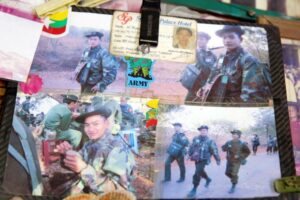Than Than Tun and Tun Lwin welcomed me warmly when I arrived at the small wooden house they rent in Insein Township, Rangoon. As they showed me into a modest room, measuring about 7 feet by 10 feet, I noticed that the walls were plastered with nostalgic photos of their son, the late Capt. Aung Kyaw Myint.
“We had photos of our son taped all over the room,” said Than Than Tun, his mother. “My husband doesn’t want to remove them. I want to take them down and keep them somewhere else, because I really miss him when I see those photos.”
When Aung Kyaw Myint left home for military operations, his parents said, he parted only with the words, “I have to take responsibility for security.” Tun Lwin said that after his son’s most recent deployment, he began to worry when he didn’t hear from him the evening of Feb. 9, the night that deadly conflict erupted in Kokang Special Region, an autonomous zone bordering China in eastern Burma’s Shan State.
Then on the morning of Feb. 10 Tun Lwin received a phone call. Their son’s army acquaintance called and explained, Tun Lwin said, that “Captain Aung Kyaw Myint was down.”
No one has explained exactly how their son lost his life. Tun Lwin said he called the regional command in Laukkai, the administrative capital of Kokang and the site of some of the fiercest fighting, but he got only a “confirmation” of his son’s death. At that point it began to sink in that the pair was left all alone; their only other son died in a bomb blast at Rangoon’s Junction 8 in 2005.

Aung Kyaw Myint was deployed for duty with the Light Infantry Division No. 570, stationed in Hopan Township, Kokang Special Region. He died on Feb. 9, his 29th birthday. His voice cracking, Tun Lwin said that they had spoken just that morning. Aung Kyaw Myint told his parents that he had an operation later in the day, and when his parents called back at 4pm the line was dead.
“He is a good boy,” said Tun Lwin, recalling that his son promised him that very morning that he would purchase land for the family upon his return. “He said he would call us back in the evening, but he never did.”
Clashes between the Burma Army and Kokang troops known as the Myanmar National Democratic Alliance Army (MNDAA) erupted on Feb. 9, devastating the region’s administrative capital and former rebel stronghold Laukkai.
The ensuing conflict has left dozens of government troops—including 5 officers—and 18 rebel soldiers dead, according to state figures, while thousands of civilians have been displaced. The number of civilian deaths is still unknown, though rebels estimate that 50 to 100 civilian lives were lost.
Despite the staggering scale of displacement and the possibility of civilian casualties, the episode has had the surprising effect of rounding up support for the Burma Army, a strong institution that is woven into every part of the nation’s modern history and politics. It is also an institution often villainized for decades of brutality, particularly toward ethnic minorities in the country’s border regions.
But recent events have prompted rare pro-military sentiment. Netizens even began changing their Facebook aliases to pictures of army insignia, like the iconic symbol of a light infantry division badge against the sun, to show their support for the Burma Army.
The deepest outpouring of sympathy, however, has been toward soldiers like Aung Kyaw Myint; those who offered their lives to the country and suddenly lost them. His colleague and roommate, Capt. Pyae Phyo Aung, died similarly, leaving behind his wife and two young children. Another soldier who fell in the same battle at Laukkai, Lt. Hla Myo Oo, 22, was survived by both his parents and his sister.
“He loved his job so much,” said his sister, Pyone Phyusin, holding back her tears. “He joined the service out of love for it, and we can only say that we are proud of him.”

“Though he has fallen, we don’t hate the army,” she said.
Relatives of other fallen soldiers told similar stories of how they’d lost contact with their loved ones, who often supported their extended families with their army salaries, only to be suddenly informed shortly after the start of the conflict that they had been killed in action.
The Irrawaddy spoke with many families of the fallen, most of whom expressed deep pride in their sons and respect for the army. None, however have yet received any material support from the army, and several were not invited to attend the funerals of their loved ones, which were held at the war cemetery in Lashio, Shan State, on Feb. 24. Hla Myo Oo’s parents were informed of the ceremony by a family friend, and they attended the ceremony of their volition.
Those survivors currently in hospital for frontline injuries, however, have received a lot of support from the public, if not from the government. Kyaw Thu of the Free Funeral Service, famed comedian Zaganar and many other artists and philanthropists met with injured soldiers to provide moral and material support when little else was available.
Burma’s Ministry of Defense announced in late February that it had received a windfall of donations to benefit soldiers injured in the recent conflict and families of those who lost their lives, to the tune of US$213,000. While the ministry is legally obliged to provide support, The Irrawaddy spoke with a number of families of the fallen or disabled who had not yet received any material assistance.
The Rangoon Command told The Irrawaddy as of late February that it had not yet visited those citizens, while Deputy Defense Minister Maj-Gen Kyaw Nyunt recently told Parliament that millions had been spent on veteran support since July 2010, thought he did not provide a breakdown of where that money went. The ministry’s budget for the coming fiscal year is $2.7 billion, roughly 11.1 percent of the national budget.
A former commander-in-chief of the Burma Army and patron of the National League for Democracy, Tin Oo recalled that, “in our time, injured and fallen soldiers were compensated according to the severity of their injuries. The officers and the rank and file were like a family.”
Tin Oo, like many ordinary citizens, expressed sympathy for the casualties of Burma’s most recent and ongoing conflict.
“I’m sorry for the soldiers who died in Laukkai,” he said.

















